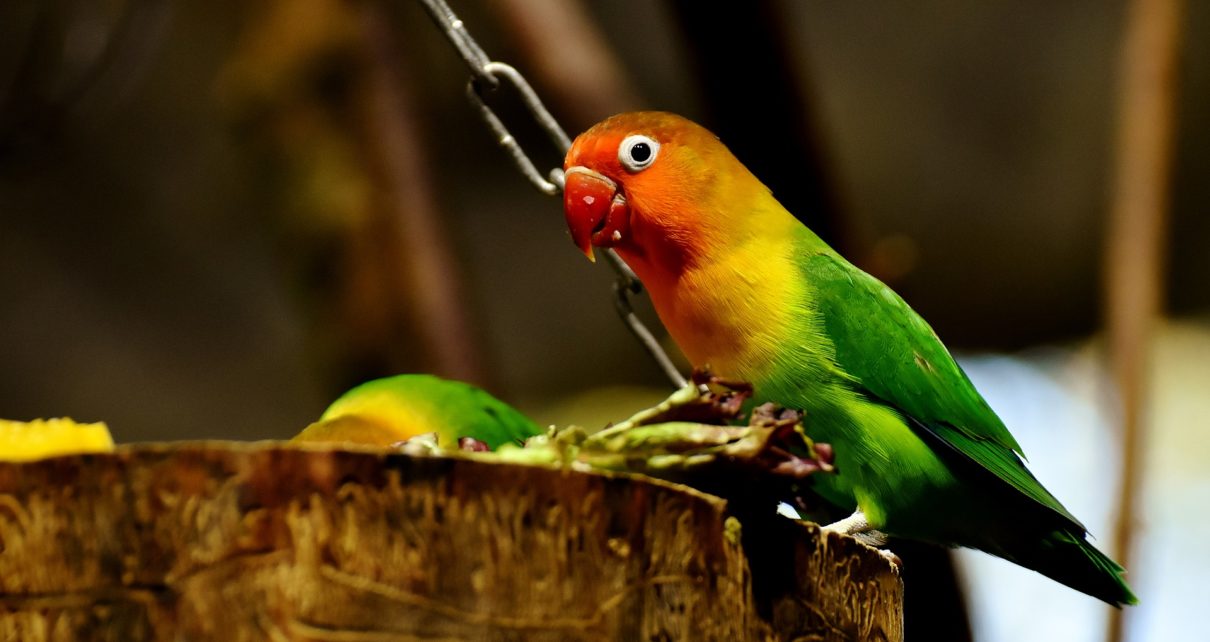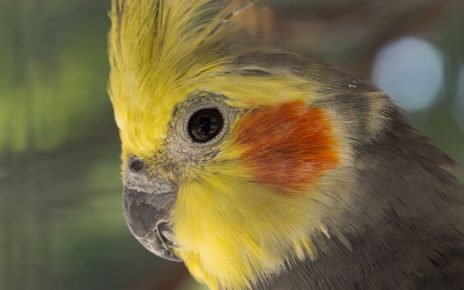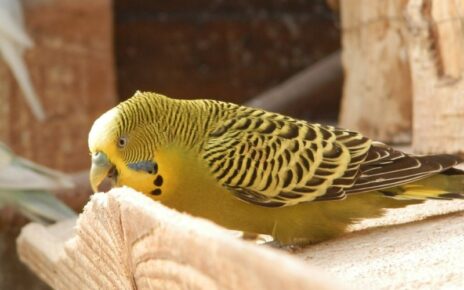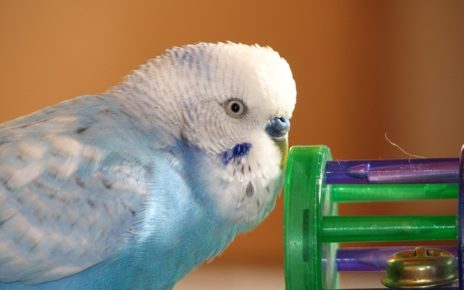Lovebirds will need to eat a variety of foods to get all the nutrients they need. They prefer to eat seeds and grains, but they also need to eat fresh fruits, vegetables, and greens. You might also want to feed your lovebird a pellet food since they are more nutritionally complete than seeds. Lovebirds also need to drink a good amount of water, so you should always provide them with fresh water throughout the day.
What Lovebirds Eat and Drink
What Do Lovebirds Like to Eat?
Pellets
Bird food Pellets are specifically formulated to meet all of your Lovebird’s nutritional needs. Pellets are something of an acquired taste though, so you want to start feeding your Lovebird pellets early. Older lovebirds that have been eating seeds and grains might not eat pellets since they can be resistant to change.
The best way to transition a lovebird onto a pellet diet is to mix a small quantity of pellets into their regular food every day. Then you can slowly increase the amount of pellets you give them until the pellets make up 75-85% of the food they eat each day.
Pellets are really the best diet you can feed your bird for their health and well being. They are much better than seed mixes since they have a uniform shape and size, and they usually have added flavors to make them more appealing. Pellets are also great for finicky eaters since they can’t be picked through like grains and seeds.
You can also find different varieties of pellets that are made for birds with special needs. Some pellets have more nutrients for fledglings, or for birds who are molting. There are even some medicated pellets that can help treat certain diseases.
Seeds
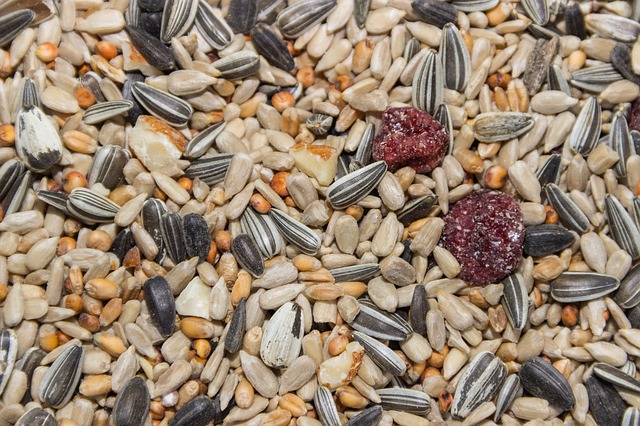
In the wild, most lovebirds will eat a diet made up of a large variety of seeds. As different plants come in and out of season, a lovebird will have to move from plant to plant looking for seeds. This natural cycle ensures they always have a balanced diet, and it also keeps them mentally stimulated as they forage for all those seeds.
In captivity, most lovebirds eat 5 to 10 different types of seeds. Most of these seeds are not the kind they eat in the wild, instead, they tend to be agricultural commodity seeds. These seeds tend to contain a lot of fat and carbohydrates, and they can be devoid of certain nutrients your bird needs.
In order to make sure your lovebird is getting enough nutrients you should feed them a wide variety of seeds. Some of the best seeds for lovebirds are Flax, Rape Seed, Safflower Seeds, Pumpkin Seeds, Soybean, Fennel, Poppy, Sesame, and Sunflower seed.
Care should be taken when it comes to feeding your lovebird sunflower seeds. Most lovebirds will eat sunflower seeds to the exclusion of all other types of seeds. This can lead to a nutrient imbalance in their diet, and it can even cause them to gain an unhealthy amount of weight.
Grains
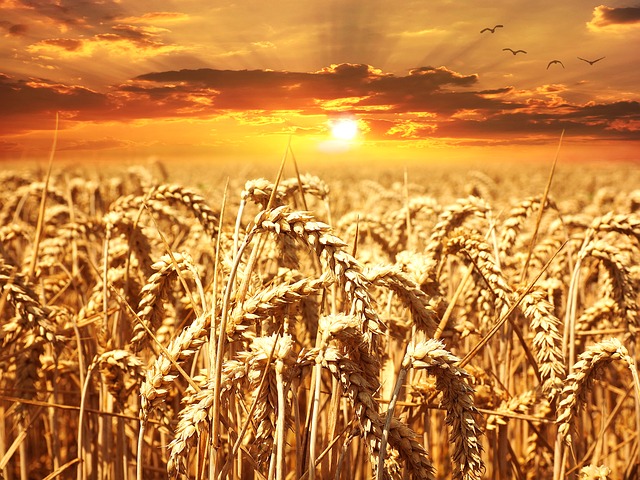
Grains are another key component of a lovebirds dietary regime. The main difference between seeds and grains is that seeds are harvested from broadleaf plants, while grains are actually grass seeds.
There are also some nutritional differences between grains and seeds. For example, grains tend to have more Omega 6 fatty acids while seeds have more Omega 3’s. Grains also tend to contain more carbohydrates than seeds, and they usually don’t have all the nutrients you tend to find in seeds.
Some of the grains that should be mixed into a well-rounded lovebird diet include Millet, Canary Grass seed, Milo, Oats, Rye, Wheat, Corn, and Rice. Corn is favored by some lovebirds since it is one of the larger grains. You can also sprout grains before feeding them to your lovebird to make it easier for them to eat.
Fruit
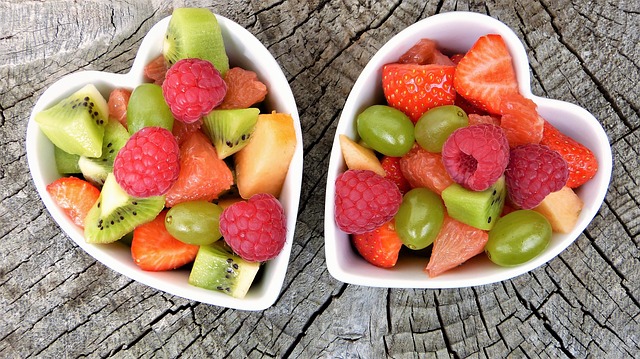
Wild lovebirds will have access to fruits when they are in season. Fruits tend to be eaten in moderation, and there are times when fruits just aren’t available for Lovebirds to eat. To mimic this natural cycle in captivity fruits should only make up a small portion of your lovebird’s diet.
When you do give your lovebird fresh fruit then it should be fed to them like a treat. You can feed them small portions of Apples, bananas, grapes, strawberry, oranges, kiwi, melon, and raspberries.
Just make sure to not overdo it with fruit since they are filled with sugar, and they actually don’t contain as many vitamins and minerals as you would think. In addition, if you do feed your lovebird dried fruit just make sure it is sulfur free.
Vegetables
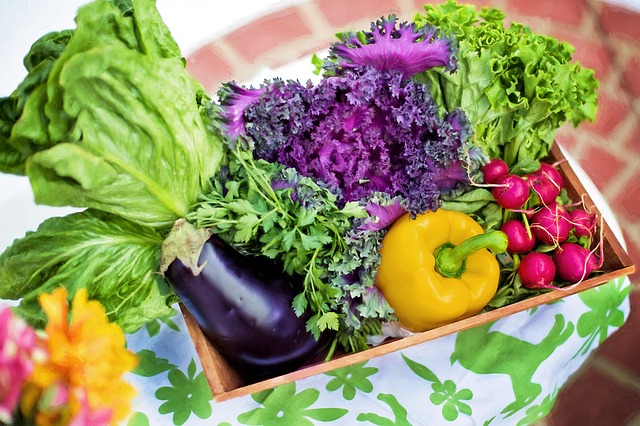
Lovebirds should eat a mix of vegetables in small quantities. Vegetables can help add variety to their diet, and they provide them with some of the nutrients they can’t get from seeds and grains.
Some healthy vegetables for lovebirds include spinach, kohlrabi, carrots, radish, beets, broccoli, cucumber, and kale. Lovebirds particularly like brassicas like kale and broccoli since they are rich in vitamins and minerals.
Iceberg lettuce is one vegetable you should avoid feeding your lovebird since it is mostly water, and it won’t provide any nutrients your Lovebird needs.
Greens
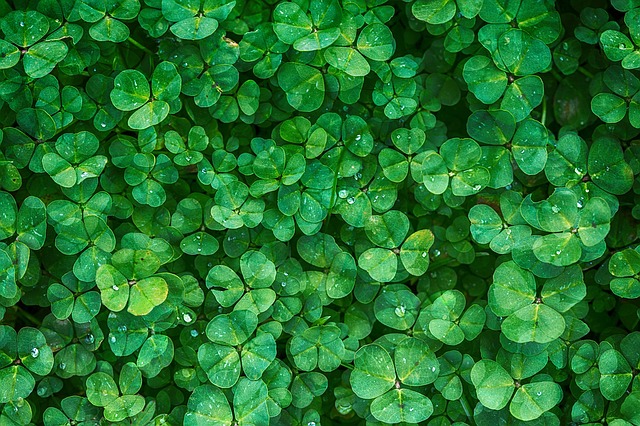
In the wild lovebirds will eat a wide assortment of greens. They mostly prefer to eat small plants with tender leaves. They will also eat newly emerged leaf buds off larger trees since they are packed with nutrients, and they tend to be easier to eat. Lovebirds will also eat weeds when they are on the ground foraging for seeds.
While it might be hard to replicate the types of greens a lovebird will eat in the wild, you can still find some good greens that a lovebird will like at the supermarket. Some of the greens most lovebirds like include watercress, parsley, and sprouts.
You can also find some healthy greens in your backyard if you know what you’re looking for. Some lovebirds will gladly eat dandelion leaves and clover, which you can find in most lawns or gardens.
Just make sure when you bring any plants in from outside that they haven’t been treated with any herbicides or pesticides. These chemicals can be toxic to birds even in small quantities.
Lovebird Food Reviews
RoudyBush Daily Maintenance, Mini Pellets
RoudyBush Daily Maintenance (Buy Online) is a nutritionally complete pellet food for Lovebirds. This food contains all the essential nutrients a lovebird needs, and it has no added sugars or artificial colors.
Overview
Primary Ingredients: Ground Corn, Ground Wheat, Soy Meal, Soy Oil
11% Protein
6% Fat
3.5% Fiber
No Artificial Preservatives or Flavors
Positives
Contains all the nutrients a Lovebird needs
Natural apple flavor
Great pellet food for birds who are used to seed
Most birds prefer it over Zupreem
Negatives
Make sure you get the mini pellets since the large ones can be too big
The recipe includes alfalfa
RoudyBush Daily Maintenance is an excellent pellet food if you want to feed your bird all natural ingredients. You can also try giving these pellets to a bird who is used to seeds since many people have reported that their birds prefer these pellets over Zupreem.
Volkman Seed Avian Science Lovebird & Conure Bird Seed
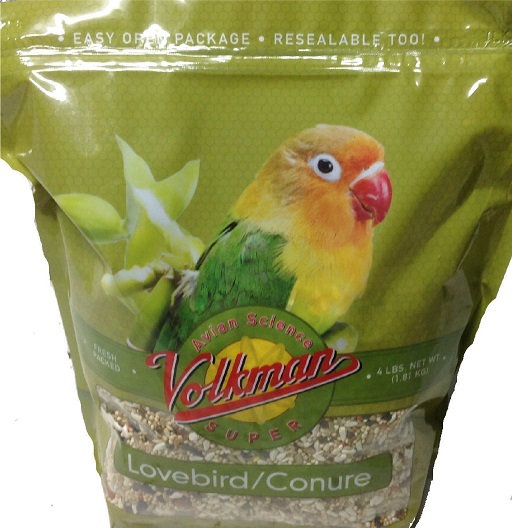
Volkman Seed Avian Science Lovebird & Conure Bird Seed (Buy Online) is a very nutritious seed mix made especially for Lovebirds. This food has many different types of grains and seeds that your lovebird will absolutely love to eat.
Overview
Primary Ingredients: White Proso Millet, Safflower Seed, Canary Grass Seed, Oat Groats and Buckwheat
14.3% Protein
16.5% Fat
9.8% Fiber
Preserved with Orange Oil
Dust Free
Positives
Contains a mix of seeds, grains, and nuts
Dried Papaya, Shredded coconut
Dried carrots
Sunflower Seeds
Negatives
Some birds might not eat all of the seeds
Seeds are large
Volkman Seed Avian Science Lovebird & Conure Bird Seed is one of the best bird seed mixes you can buy. It is made by a company that has extensive expertise in avian nutrition, so you can be sure it will provide all the essentials your bird needs.
Kaytee Forti-Diet Pro Health
Kaytee Forti-Diet Pro Health (Buy Online) is a nutritionally complete seed mix made for Lovebirds and Conures. This seed mix contains a nice blend of seeds and grains, and it has been fortified with antioxidants and probiotics.
Overview
Primary Ingredients: Sunflower Seed, Canary Grass Seed, White Millet, Safflower Seed, Wheat, Oats, Corn, and Peanuts
15% Protein
10% Fat
12% Fiber
Omega 3 Fatty Acids
Probiotics
Positives
Added vitamins and minerals make this food nutritionally complete
Probiotics help with digestion and nutrient absorption
Promotes Skin and Feather health
Made in the USA
Negatives
Insects can be a problem
Some Lovebirds won’t like the large seeds
Kaytee Forti-Diet Pro Health has more added vitamins and minerals than most of the other bird foods mentioned on this page. The antioxidants can protect your bird from free radical damage. While the prebiotics and probiotics will help with digestion and nutrient absorption. The Omega 3 fatty acids will promote cardiovascular and heart health, and it will also keep their skin supple and their feathers shiny.
Sweet Harvest Conure and Lovebird Bird Food
Sweet Harvest Conure and Lovebird Bird Food (Buy Online) is one of the best natural bird foods for Lovebirds on the market. This food contains no dyes, preservatives, chemicals, or artificial ingredients. In addition, this food is cleaned three times, so you can be absolutely sure it is dust free.
Overview
Primary Ingredients: Safflower Seed, White Proso Millet, Canary Grass Seed, Oat Groats, Green Peas, Barely, Buckwheat, and Sunflower Seeds
11% Protein
8% Fat
11% Fiber
No Fillers
Dust Free
Positives
100% natural with no artificial ingredients or preservatives
Added vitamins and minerals
Dried Fruit
Made in the USA
Negatives
Large quantities of Millet
Sweet Harvest Conure and Lovebird Bird Food is a great choice if you want an all natural seed mix. It is also made with ingredients that are grown in the USA, and it is packaged in a facility in Colorado, so you can be sure that it isn’t using inferior ingredients from overseas.
Higgins Vita Seed Conure & Lovebird Food
Higgins Vita Seed Conure & Lovebird Food (Buy Online) is an excellent bird seed blend that has been fortified with probiotics and Omega 3’s. It also contains a nice mix of dried fruits that will keep your lovebird’s interested in this feed.
Overview
Primary Ingredients: White Millet, Safflower, Oats, Sunflower Seeds, Wheat, Flaxseed, Peanuts, Red Millet, Ground Corn, Flaked Corn, Flaked Peas, and Buckwheat
13% Protein
12% Fat
8.5% Fiber
Omega 3 Fatty Acids
Probiotics
Positives
Contains a mix of pellets and seeds
Dried Fruit Mix
Contains Nuts
Fortified with Vitamins and Minerals
Negatives
Lots of millet seeds
Picky birds might leave most of the seeds
Higgins Vita Seed Conure & Lovebird Food is a great seed mix if your Lovebird likes to eat a wide variety of seeds and grains. It will also satisfy birds that like fruit and vegetables mixed into their feed. The pellets in this food will also make it easier to switch your Lovebird over to pellets once they get used to eating pellets mixed in with seeds.
What Can Lovebirds Drink?
Water
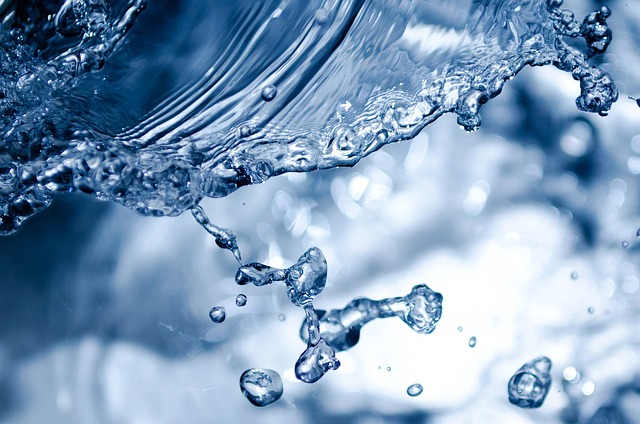
A lovebird will need to drink at least 5 to 10 ounces of water each day in order to stay properly hydrated. Be sure your Lovebird always has fresh water that is free of waste and debris. You also should clean their water bowl every day, so it doesn’t end up becoming a breeding ground for bacteria.
In most areas, the tap water will be good enough for your lovebird to drink. If you’re on a well then you might want to get it tested before you give your lovebird any well water. Well water can have high concentrations of iron and other minerals that can harm a lovebirds kidneys.
Some tap water can also contain a lot of harmful minerals, so if you know you have hard water you might want to think about getting a filtration system. A reverse osmosis system (Buy Online) will remove all the dissolved solids which will make your water safe for your bird to drink.
Liquid Vitamins
You can add Liquid Vitamins (Buy Online) to your lovebird’s water if you think they might not be getting enough nutrients from the food they eat. Liquid vitamins can also be given to sick birds to help speed up their recovery.
Liquid vitamins are also relatively cheap since you’ll only need to give your bird a few drops each day. Those few drops are worth it since most liquid vitamins contain vitamin A, vitamin D3, B vitamins, and choline, which are all vital nutrients that a lovebird needs to stay healthy.
If you do give your lovebird liquid vitamins always make sure that their water bowl is clean. The vitamins can act as a nutrient source for bacteria which will cause them to replicate rapidly. In order to avoid this keep the bowl free of debris, and you should also sterilize the bowl periodically to kill any bacteria or fungi.
Juice
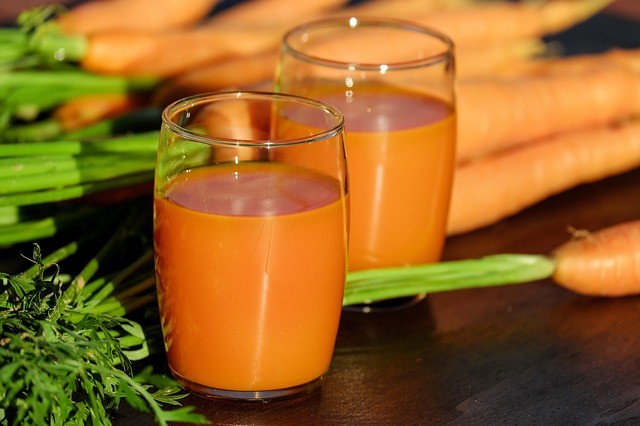
You can give your lovebird fruit juice in moderation, but it shouldn’t make up a large portion of what they drink. A little sip here and there won’t hurt them, but if they drink too much the sugars and acids can be unhealthy.
Some birds will be more sensitive to the acids in orange juice and other juices that contain acidic fruits. The acid can lead to intestinal discomfort, and it might even cause diarrhea. That’s why it’s best to avoid high acid fruits altogether.
Vegetable juice might actually be a better choice since vegetables tend to have higher alkalinity. They also have fewer sugars, and they are rich sources of vitamins and minerals that most birds need.

